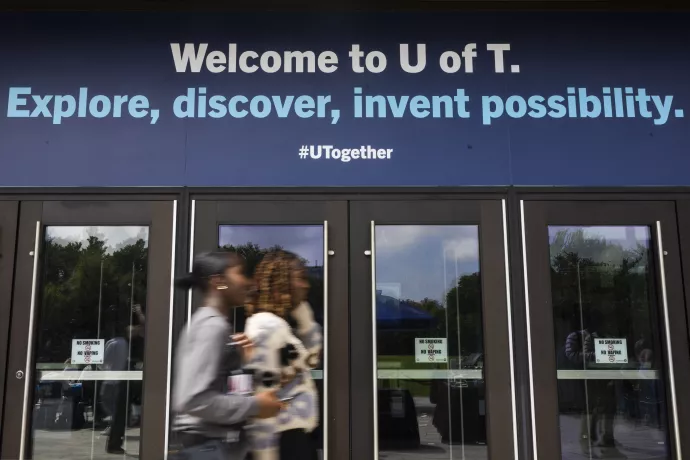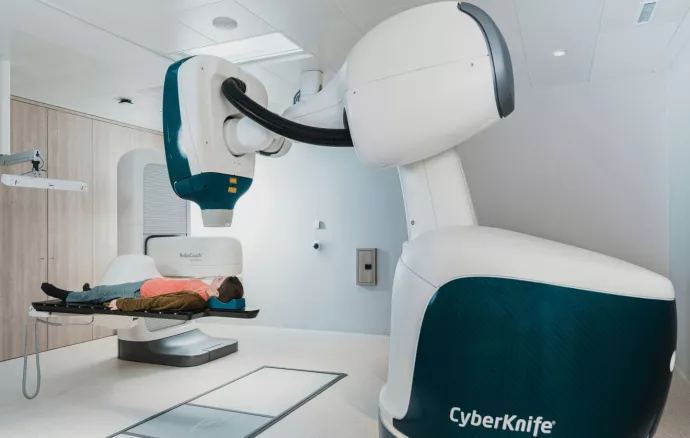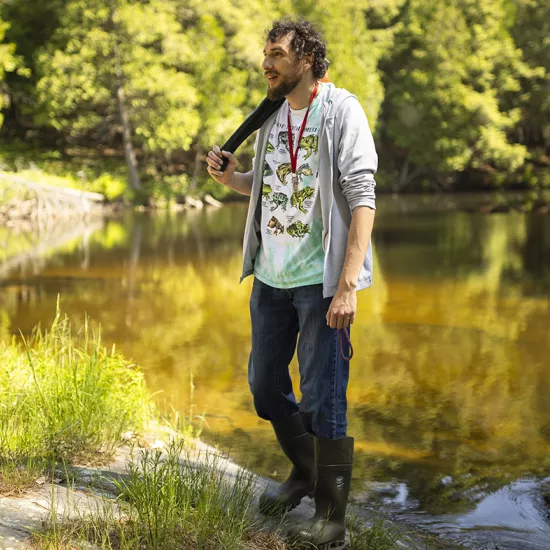Cool new UTM courses for 2024-2025

University of Toronto Missisisauga students can learn about medical uses for robots, consider solutions to the housing crisis, communicate using emoji and more in courses offered for the first time this academic school year. Plus, a new co-op internship program has launched for students enrolled in several programs.
Prerequisites and availability will vary. Interested students can consult the Academic Calendar or Timetable Builder to learn more.
Here are some of the cool new offerings for the 2024-25 school year.

Course: The Natural City: Cultural Approaches to Urban Sustainability
Course number: ANT371H5
Offered in: Fall 2024
Taught by: Associate Professor Stephen Scharper
For the first time in human history, more than half the world’s peoples live in cities. Furthermore, it’s estimated that by 2030, over 60 per cent will be urban dwellers. This demographic shift suggests that for many people, their primary encounter with “nature” will be urban-based. This anthropology course explores the city through a multispecies lens and challenges assumptions about the human-centeredness of urban places.
In the course, students will use a variety of approaches, including journaling, archival research, photography, sound-scaping, and more, to explore the following questions:
- How do ideas about nature-culture shape our interactions with nonhumans in cities?
- How do built environments structure human-nonhuman relationships in urban spaces?
- How have human-nonhuman interactions changed over time in cities?
- How can we foster more compassionate and caring relationships with nonhumans in cities — and how might we do this in the context of social-ecological injustices and climate change?
- What might a thriving multispecies city of the future look like?

Course: Black British Literature
Course number: ENG355H5
Offered in: Fall 2024
Taught by: Sessional Lecturer Natasha Vashisht
Created by Assistant Professor Anna Thomas, this English & drama course is an advanced introduction to the concept and key texts of “Black British literature.” The term arises directly in response to empire and the postcolonial, Black British literature indicates texts written by both African-descended and South Asian-descended writers from the Caribbean, Africa and the subcontinent. Focused primarily on the 20th century, learners this fall will contextualize this literary tradition within wider questions of Britain in the world and how the idea of literary influence is challenged and reformed.
Attendees of this course can expect to read works by writers such as:
- Sam Selvon,
- Hanif Kureishi,
- Derek Walcott,
- Stuart Hall,
- Buchi Emecheta,
- Caryl Philips,
- Zadie Smith,
- Helen Oyeyemi, and
- Warsan Shire.

Course: Introduction to Medical Robotics
Course number: CSC379H5
Offered in: Winter 2025
Taught by: Assistant Professor Lueder Alexander Kahrs
Robotics are increasingly prevalent in medicine, from operating rooms to clinical and therapeutic settings.
This mathematical and computational sciences course examines medical robotics from an application-driven perspective. Students will discuss different categories of medical robots and related application principles for therapeutics, with most examples drawn from surgical robotics.
A central focus of the course will be on the computer methods that assist physicians during their use of robotic treatments for patients. These computer-assisted methods include treatment planning, patient registration, human-robot interaction, robot control and task execution. Students will implement and explore these methods in a practical environment that includes the use of real robots.

Course: Special Topics in Invertebrate Evolution
Course number: BIO484H5
Offered in: Winter 2025
Taught by: Assistant Professor Kara Layton
Did you know that invertebrates make up 95 per cent of the animal diversity on the planet?
Yet invertebrates — cold-blooded animals with no backbone such as insects and crabs — are one of the most under-studied taxonomic groups.
This winter 2025 biology course builds on students’ existing knowledge of invertebrates to discuss complex evolutionary processes that have shaped patterns of diversity, bringing in relevant information from invertebrate ecology and biology.

Course: Emoji Rhetoric: A New Paradigm in Communications
Course number: ISP250H5 LEC0101
Offered in: Winter 2025
Taught by: Assistant Professor Jordana Garbati
This social sciences course on the emoji is offered by Institute for the Study of University Pedagogy to students of all disciplines.
Students will critically examine the development and use of emoji in digital written communication. The course will begin with a historical view of emoji. Students will then explore how and why emoji are used in diverse digital writing genres.
Emoji can communicate emotions, and can be used in persuasive communication, but can also lead to miscommunication. Students will also examine the impact of gender, age, and culture on emoji use. Learners are invited to question whether emoji is a language in and of itself.
Finally, this course will push students to consider the future uses and contributions of emoji in writing.
Learn more by watching the video below:
Course: Special Topics in Management & Innovation: Housing Crisis Solutions
Course number: IMI2001H
Offered in: Fall 2024
Taught by: Professor Yinnon Geva
Here’s one for the graduate students from the Institute for Management & Innovation (IMI): The housing crisis in Canada is a classic case of a “wicked problem”: a complex social challenge whose solution requires multiple, contradictory, and sometimes unattainable measures.
Housing markets and policies are notoriously inflexible and often evolve a slow pace even in the face of an urgent need for change. Still, there have been several moments of ‘critical conjuncture’ in history, when policy interventions have drastically changed the housing sector over a short period of time. What, then, does it take to solve a crisis? Why is innovation so difficult in the realm of housing? How can we become housing innovators?
In this course, students will examine innovation in housing through two lenses. First, participants will examine major changes in the history of housing, their causes, and their legacies. Second, for each topic, students will examine recent reform and innovation efforts. Students can expect to hear from guest lecturers from the public, private, and non-profit sectors.
The course will provide a basic introduction to the world of housing and does not require prior knowledge.
Graduate students from all University of Toronto campuses are welcome to enroll in IMI electives.

UTM Co-op Internship Program
Starting this academic school year, UTM students enrolled in certain programs of study have the opportunity to participate in the UTM Co-op Internship Program, or UTMCIP. The UTMCIP is administered by the experiential education unit (EEU) within the Office of the Vice-Principal Academic and Dean and is a professional work-integrated learning opportunity that includes a 12-month or 16-month paid, full-time, academically related work experience. The time to degree completion for students enrolled in the UTMCIP is normally five years. Students who complete the UTMCIP graduate with an acknowledgement on their transcript.
Five academic units and programs have optional UTMCIP streams:
- Department of biology
- Department of chemical and physical sciences
- Department of economics
- Department of mathematics and computational sciences
- Institute of Communication, Culture, Information and Technology



